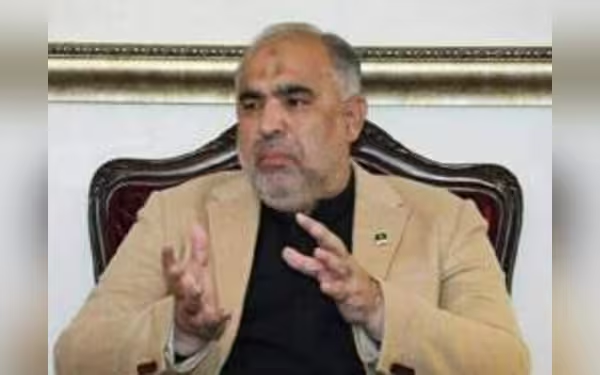Saturday, November 16, 2024 05:29 PM
Asad Qaiser Seeks Clarity on Legal Cases in Islamabad High Court
- Asad Qaiser challenges politically motivated FIRs against him.
- Petition highlights violations of fundamental rights.
- Court's decision may impact Pakistan's political landscape.
 Image Credits: nation_pk
Image Credits: nation_pkAsad Qaiser approaches Islamabad High Court seeking clarity on politically motivated FIRs against him, highlighting fundamental rights violations.
In a significant legal move, former Speaker of the National Assembly, Asad Qaiser, has approached the Islamabad High Court (IHC) to seek clarity on the numerous cases filed against him. This action comes amid a backdrop of political turmoil in Pakistan, where allegations of politically motivated actions have become increasingly common. Qaiser, representing the Pakistan Tehrik-e-Insaf (PTI) party, has raised concerns about the legitimacy of several First Information Reports (FIRs) lodged against him and his party members.
Asad Qaiser filed his petition through his lawyer, Ayesha Khalid Advocate, naming several high-ranking officials as respondents, including the Secretary of Interior and the Chairman of the National Accountability Bureau (NAB). In his petition, Qaiser claims that he is a victim of a systematic campaign aimed at undermining his rights and those of his party. He stated, "A number of politically motivated and unlawful FIRs have been lodged against me, and hundreds of such fabricated FIRs have been filed against other leaders and workers of PTI." This assertion highlights the broader issue of political repression that many believe is affecting the democratic fabric of the nation.
Qaiser’s petition emphasizes the severe implications of these actions, which he argues violate fundamental rights guaranteed under the Constitution of Pakistan. He specifically referenced Articles 9, 10A, 15, 16, 17, 19, and 25, which protect citizens' rights to life, liberty, fair trial, and freedom of speech, among others. He expressed his concerns about the potential for arbitrary arrests and the curtailment of his freedoms without due process, stating, "I apprehend that my freedom will be abruptly curtailed by the state without notice." This sentiment resonates with many citizens who fear the erosion of their rights in the current political climate.
In his plea, Qaiser also mentioned that he had previously sought information from the Deputy Inspector General (DIG) of Operations regarding the alleged fake FIRs but was met with reluctance. This lack of transparency has prompted him to request the court to order the respondents to provide a comprehensive list of all cases, FIRs, and complaints registered against him. He is also seeking details of any ongoing inquiries or investigations that may be pending.
The situation surrounding Asad Qaiser is emblematic of the challenges faced by political figures in Pakistan today. As the country grapples with issues of governance, accountability, and civil rights, the outcome of this case could have far-reaching implications not only for Qaiser but also for the political landscape as a whole. The court's decision will be closely watched, as it may set a precedent for how political dissent is treated in the future.
Asad Qaiser’s legal battle is more than just a personal struggle; it reflects a larger narrative about the state of democracy in Pakistan. As citizens, it is crucial to remain informed and engaged with these developments, as they ultimately shape the rights and freedoms we all cherish. The protection of fundamental rights is not just a legal issue; it is a cornerstone of a healthy democracy that requires vigilance and active participation from all sectors of society.













